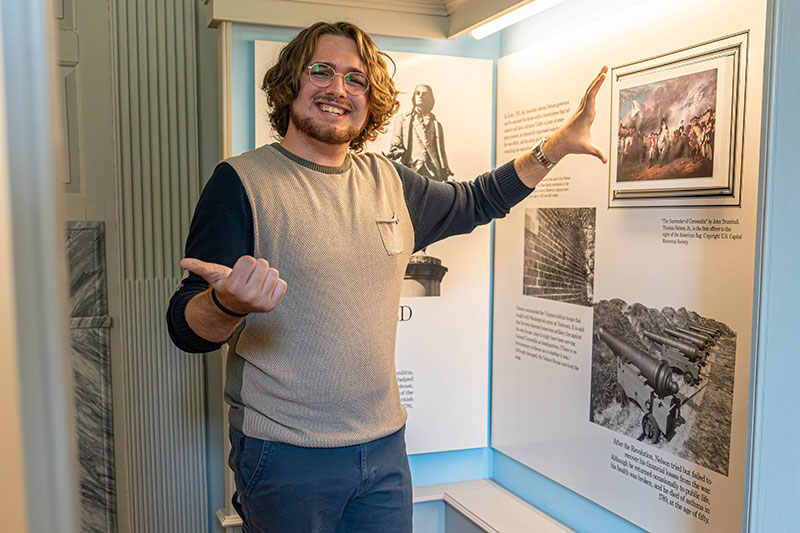
Read time:
Captains have fanned out across the world, interning in a multitude of fields as they follow their passions, make connections, and build invaluable experience.
Alyssia Jimenez ‘26 Criminology and Psychology, spent summer 2025 at crime scenes in Richmond, collecting evidence and learning forensics first hand.
Aidan Wells, ‘27 History, worked on archaeological digs and paleontology projects in Yorktown and Williamsburg.
And Hannah Dennis ‘ 26 Biochemistry, conducted research on global health in Costa Rica.
While all of the students have different interests and career paths, they have in common the fact that their internships were powered by grants from CNU’s Center for Career Planning. The grants allowed them to immerse themselves in unpaid positions that have the ability to shape their career paths.
Jimenez, Wells and Dennis, along with 33 other enterprising Captains, were awarded the grants to pursue internships, research, and other work-based learning opportunities. The funds help the interns pay for transportation and other material costs so they can instead focus on building their resumes and base of knowledge.
“We have students completing internships in a wide variety of industries, including communications/media, counseling, finance, government, historical services, hospitality, law, law enforcement, medical sciences, museums, nonprofits, recreation, tourism, etc.,” said Sarah Hobgood, director of the Center for Career Planning.
The internships have turned out to be transformative, providing an on-the-job viewpoint that gives them the ability to not only apply what they have learned in the classroom, but also gain an understanding of what a career in their potential fields looks and feels like.
“This is one of the first serious ventures I’ve undertaken to explore a career avenue related to my field of study, and it has been exceptional,” said Wells, who interned for the Cultural Resources Department with the Colonial National Historic Park in Yorktown. “I’m doing a wide variety of things, from social media strategy planning and writing about artifacts in our collection, to researching and interpreting symbolism on our cannons, to doing excavation work on an archaeological dig and even performing paleontological monitoring.”
Internships are one of the four pillars of a CNU education, and play a key role in elevating a student’s real-world experiences and expanding their skills sets and perspectives. The Class of 2024 exemplifies the focus Christopher Newport places on internships, as 80 percent of the graduates completed some type of internship or work-based learning experience.
In addition, the University’s emphasis on internships garnered national attention when The Princeton Review ranked it No. 7 in the nation for the breadth of internship opportunities offered to students.
“By completing a least one internship or work-based learning experience before they graduate, students strengthen their candidacy for full-time jobs as they bring both the valuable liberal arts degree from Christopher Newport and field experience from their internship.” Hobgood said. “Through internships, students can apply what they are learning in the classroom to the working world and bring industry knowledge and experience back into the classroom.”
For Dennis, who interned at the Universidad Nacional de Costa Rica and conducted research analyzing global health leadership responses during the COVID-19 pandemic, the experience has been critical to advancing her goal of being a doctor.
“This internship is incredibly important to my journey as a pre-med student at CNU. It’s helping me to build both academic and cultural competencies while providing firsthand insight into how healthcare systems function across countries, all of which will inform my future medical practice and advocacy work,” she said.
Jimenez has had an equally productive and insightful experience working for the Richmond Police Forensics Unit. At crime scenes, she was tasked with logging and collecting evidence and also sketching the location of any cartridge casings related to the crime being investigated.
“In one word I would say the internship has been eye-opening. It’s been really beneficial to see firsthand everything we’ve talked about in classes, it just makes it all more real and kind of ties everything together,” said Jimenez, who plans to pursue a master’s in forensic science. “This internship is integral to my future goals, I have gained real life experience in the criminal justice world and really have gotten a feel for the things I’ll be pursuing later in life.”
For all three interns, the grant money has provided them the flexibility to work unpaid internships that offer invaluable experience.
“It has been instrumental in helping me to afford this opportunity,” Wells said. “Thanks to the grant, I have been able to pay for my living and travel expenses related to the internship, without which I wouldn’t even be able to participate. I am incredibly grateful.”